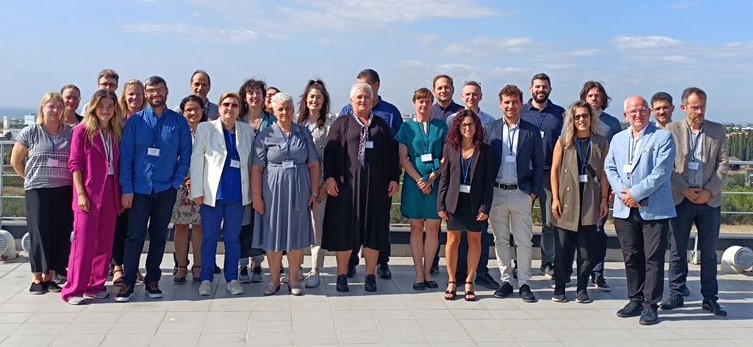Members of the ICN2 Nanobioelectronics and Biosensors Group took part in the meeting that marked the start of the scientific activities of the recently funded 2D-BioPAD project. Thanks to EUR 6 million in funding, the project will develop a compact and easy-to-use device for the early diagnosis of Alzheimer's Disease.

Funding for the 2D-BioPAD project, which aims to develop a point-of-care (POC) system for the in-vitro diagnosis of Alzheimer's Disease (AD), was recently granted by the European Union via its Horizon Programme to a Consortium that includes the ICN2. Group leader ICREA Prof. Arben Merkoçi and postdoctoral researchers Dr Ruslan Álvarez Diduk and Dr Marianna Rossetti, from the Nanobioelectronics and Biosensors Group, participated in the kick-off meeting that took place on 10-11 October in Thessaloniki (Greece).
With about 6 million euros over four years and the participation of 11 partners led by CATRIN – RCPTM, 2D-BioPAD will exploit nanotechnology and the unique properties of graphene, as well as the power of artificial intelligence, to provide an innovative technological solution for the early diagnostics of Alzheimer's disease.
The technique introduced by 2D-BioPAD –an acronym for “Graphene Bio-Platform for point-of-care early detection and monitoring of Alzheimer’s Disease”— will enable the rapid and reliable identification and quantification of up to five biomarkers for the diagnosis of this increasingly common disease. The device will be non-invasive, cost-effective, and suitable for point-of-care application. In addition, a user-friendly digital interface providing key metrics will accompany the device, and artificial intelligence will be employed to improve the overall implementation of the system.
The effectiveness of the 2D-BioPAD system and its impact on fast diagnostics will be demonstrated through two pilot clinical studies to be conducted in three European centres (in Finland, Greece, and Germany). A wide range of stakeholders, including industrial and clinical entities, will contribute to identifying essential safety and ethical-by-design principles and guidelines to facilitate transfer to primary healthcare settings and to maximise acceptance and impact to both physical and digital supply chains.
The 2D-BioPAD consortium, under the leadership of CATRIN-RCPTM at Palacky University Olomouc, is composed of 11 partners across 8 European countries: Czechia, Denmark, Finland, France, Germany, Greece, Ireland, and Spain. The consortium members include: Palacky University Olomouc (UP), Q-Plan International, Catalan Institute of Nanoscience and Nanotechnology (ICN2), Grapheal, Aristotle University of Thessaloniki (AUTh), Novaptech, University of Eastern Finland (UEF), Greek Association of Alzheimer's Disease and Related Disorders (GAADRD), Envia, Central Institute of Mental Health in Manheim (ZI), and University College Dublin/National University of Ireland (NUID UCD - CeADAR).

